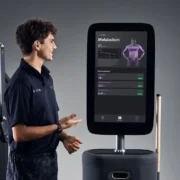It’s Time to Wake Up to the Business of Sleep, Executives Say

As sleep takes center stage in wellness, top executives at the ATN Innovation Summit explain its importance for brands in all sectors
Even after years of universal appreciation, the value of a “good night’s sleep” is still going up. It’s a surge executives from tech brands to mattress suppliers agree on — and something everyone should take into account.
“Four billion people struggle with sleep — and that’s having an effect on everything else,” said Colin Lawlor, the founder and CEO of Sleep.ai at the ATN Innovation Summit 2025. “The reality is, how they sleep is how they engage with you and your service.”
Joined on stage by George Hanson, chief digital officer at Mattress Firm and Tim Roberts, vice president of science and innovation at Therabody, Lawlor shared that sleep is currently the number one searched topic with consumers when it comes to health and wellness. It’s a shift that’s taken place largely over the past decade and is likely only at the beginning of its journey.
Why Sleep? Why Now?
Being an activity that everyone does, sleep having a sizable market around it doesn’t take too much explaining. However, the recent jump in interest carries a stronger rationale. Sleep has largely benefited in unison with the general wellness industry via the post-pandemic surge in interest around health and longevity. It’s also never had more data behind it, improving insights and results.
“We’re at this incredible opportunity where we have more data than ever, more personalized insights and then AI on top of this, we have this opportunity to contextualize the product of sleep to your product, to your business,” said Roberts. “It’s really the perfect storm.”
Roberts also called sleep the “great connector,” citing its ability to assist athletes and people looking to solve issues with pain or improve their skin health.
Turning Insights to Outcomes
But while the data around sleep is abundant, it’s also led to smaller shifts in consumer behavior, which in some cases put new challenges in front of those looking to leverage it. Skepticism around the term “science-backed” resembles one glaring change over the past handful of years.
“A lot of companies say they’re ‘science-backed’ but the consumer is ahead of that,” said Lawlor. “They’re actually looking at the science. They want to know it’s peer-reviewed. They want to see the data themselves.”
There’s also the task of consolidating data, especially with so many wearable devices tracking sleep factors through different methods and with different metrics. Hanson called the task of harmonizing data to present consistent insights the “biggest challenge” in relation to its variability.
How Brands Can Monetize Sleep
According to Roberts, the first step in leveraging sleep from an operator standpoint is acknowledging its ample benefits and broad, connective nature.
“As soon as you start to recognize the opportunity that sleep has in your unique business or service, it’s the first step to doing more, seeking the right partners and finding the right opportunities,” he said. “Sleep sits adjacent to every product and every experience — because we are humans.”
He and Hanson also shared their own personal thoughts on what goes into a good night’s sleep. For Roberts, it’s having a specific, repeatable routine to conduct before bed each night. Hason cited setup as well, noting the need for a dark room and consistent temperature.
“Wake up,” Lawlor concluded. “Sleep is actually driving your business.”
This article is based on a live discussion held during the ATN Innovation Summit 2025, a two-day event dedicated to the future of fitness and wellness. See here for More Innovation Summit coverage.



